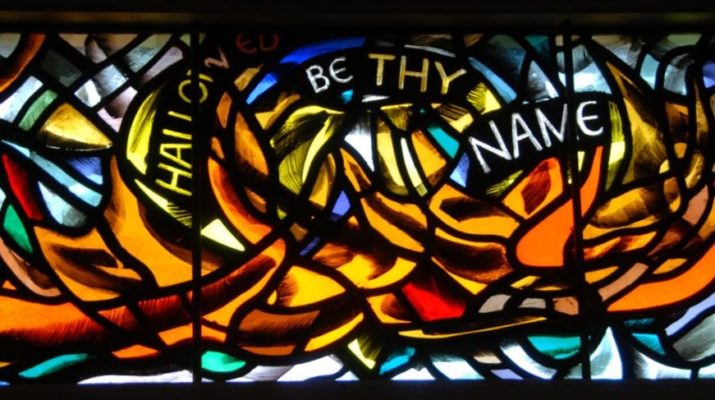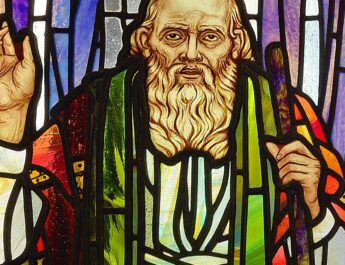Matthew 6:9-13
A Women’s Lectionary 42
9 “Pray,A then, in this way:
Our FatherB in heaven,C
may your nameD be revered as holy.E
A “pray” = proseuchomai. From pros (advantageous for, at, toward) + euchomai (to wish, make a request, pray). This is to pray or pray for, to worship or supplicate. It is more literally exchanging one’s own wishes for God’s.
B “Father” = Pater. This is father in a literal or figurative sense. Could be elder, senior, ancestor, originator, or patriarch.
C “heaven” = ouranos. May be related to oros (mountain, hill) with the notion of height. This is the air, the sky, the atmosphere, and heaven. It is the sky that is visible and the spiritual heaven where God dwells. Heaven implies happiness, power, and eternity.
D “name” = onoma. May be from ginosko (know, recognize, learn from firsthand experience). This is a name, authority, cause, character, fame, reputation. The name was thought to include something of the essence of the person so it was not thought to be separate from the person.
E “revered as holy” = hagiazo. From hagios (sacred, holy, set apart, different other; physically pure, morally blameless, or ceremonially set apart); from hagnos (holy, sacred, pure ethically, ritually, or ceremonially; prepared for worship, chaste, unadulterated, pure to the core; undefiled by sin; figurative for innocent, modest, perfect). This is to make holy, consecrate, sanctify, set apart as holy, purify, venerate.
10 May your kingdomF come.G
May your willH be doneI
on earthJ as it is in heaven.
F “kingdom” = basileia. From basileus (king, emperor, sovereign); probably from basis (step, hence foot; a pace); from baino (to walk, to go). This is kingdom, rule, authority, sovereignty, royalty, a realm.
G “come” = erchomai. This is to come or go.
H “will” = thelema. From thelo (to desire, wise, will, intend). This is the act of will, choice, purpose, or decree.
I “be done” = ginomai. This is to come into being, to happen, become, be born. It can be to emerge from one state or condition to another or is coming into being with the sense of movement or growth.
J “earth” = ge. This is earth, land, soil, region, country, the inhabitants of an area.
11 GiveK us todayL our dailyM bread.N
K “give” = didomi. To give, offer, place, bestow, deliver. This is give in a literal or figurative sense.
L “today” = semeron. From hemera (day, time, daybreak); perhaps from hemai (to sit). This is today, now, at present.
M “daily” = epiousios. 2x in NT. From epeimi or epiousa (next, following, next day or night); {from epi (on, upon, against, what is fitting) + heimi (to go)}. This is necessary, sufficient – what is needed for subsistence or suitable for what is happening.
N “bread” = artos. Perhaps from airo (raise, take up, lift, remove). This is bread or a loaf. It is a loaf as raised.
12 And forgiveO us our debts,P
as we also have forgiven our debtors.Q
13 And do not bringR us to the time of trial,S
O “forgive” = aphiemi. From apo (from, away from) + hiemi (to send). This is send away, release, permit, forgive, allow to depart, discharge, or send forth.
P “debts” = opheilema. 2x in NT. From opheilo (to be indebted morally or legally – having an obligation one must meet; perhaps from the legal world, but then adopted in reference to morality; used to refer to humanity’s ethical responsibility); probably from ophelos (advantage, gain, profit); from ophello (heaped together, accumulate, increase). This is something owed, an offense, a sin.
Q “debtors” = opheiletes. Related to “debts” in v12. 7x in NT. From opheilo (see note P above). This is one who owes so it is a debtor or someone under obligation. Figuratively, it is a culprit, delinquent, or a sinner.
R “bring” = eisphero. 8x in NT. From eis (to, into, for, among) + phero (to bear, bring, lead, make known publicly; to carry in a literal or figurative sense)}. This is to carry in, lead into, or announce. It can be literal or figurative.
S “time of trial” = peirasmos. From peirazo (to test, try, tempt, or make proof of, scrutinize, or assay something; could also be examine, entice, prove, or discipline); from peira (trial, experiment, attempt, experience, assaying); from the base of peran (over, beyond, across); akin to pera (on the far side); from a derivative or peiro (to pierce). This is a test as in an experiment or assaying. It is also trial, temptation, and discipline. Further, it could be used to mean calamity, affliction, or adversity more generally.
but rescueT us from the evilU one.V
T “rescue” = rhuomai. 18x in NT. Related to eruo (to draw or drag) OR related to rheo (to flow, overflow). This is to rescue or set free. It is to deliver from danger, to snatch up.
U “evil” = poneros. From poneo (to toil); related to ponos (pain, trouble, labor, distress, suffering; toil, which implies anguish); from the base of penes (a laborer, poor person, starving or indigent person; someone who works for their living); from pernomai (working for a living; laborer, poor person; to work for daily bread); from peno (to toil to survive day by day). This is bad, evil, wicked, malicious, grievous, or toilsome. Properly, it is something that bears pain – it emphasizes the miseries and pains that come with evil. By contrast, the Greek kakos refers to evil as part of someone’s core character. Also contrasting the Greek sapros, which deals with falling away from a previously embodied virtue. This word can mean ill, diseased, morally culpable, derelict, vicious, malicious, or guilt. It can also refer to the devil or sinners.
V Some manuscripts add, “for yours is the kingdom and the power and the glory into the ages – amen.” = hoti + su + eimi + ho + basileia + kai + ho + dunamis + kai + ho + doxa + eis + ho + aion + amen. “Power” = dunamis. From dunamai (to be able, have power or ability). This is might, strength, physical power, efficacy, energy, and miraculous power. It is force literally or figuratively – the power of a miracle or the miracle itself. “Glory” = doxa. From dokeo (to have an opinion, seem, appear, suppose; a personal judgment; to think); from dokos (opinion). This is literally something that evokes a good opinion – something that connects to our understanding of intrinsic worth. The ultimate expression of this is, of course, God and God’s manifestation. So, this is opinion, honor, and dignity, but also praise, glory, renown, and worship. “Ages” = aion. From the same as aei (ever, always, unceasingly, perpetually; on every occasion). This is an age, cycle of time, course, continued duration. It is also used to describe the eternal or forever. This is the word used to discuss the present age or the messianic age. “Amen” = amen. From Hebrew amen (verily, truly, amen, truth, so be it, faithfulness); from aman (to believe, endure, fulfill, confirm, support, be faithful, put one’s trust in, be steadfast. Figuratively, this is to be firm, steadfast, or faithful, trusting, believing, being permanent, morally solid). This word is literally firmness, but figuratively fidelity, faithfulness, honesty, responsibility, trust, truth, steadfastness. Properly, it is to be sure, certain, or firm. This is a word of emphasis indicating that something crucial follows.
Image credit: “Stained Glass Lord’s Prayer” by Greying_Geezer, 2011.




